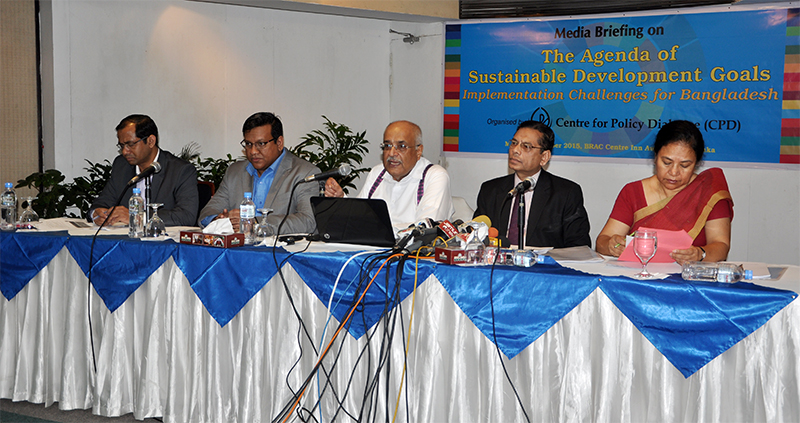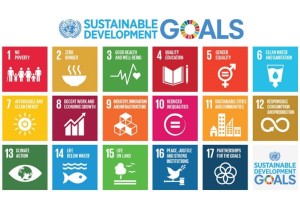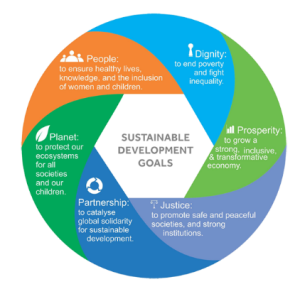Bangladesh should build on its attainments and unfinished agenda as regards the Millennium Development Goals (MDGs) with particular emphasis on economic reformation, employment generation and governance for successful implementation of the Sustainable Development Goals (SDGs).
Attainment of the SDGs would require a strong and effective institutional mechanism involving all stakeholders including public representatives across the country, government and the bureaucracy, private sector, civil society, knowledge community, and development partners.

(left) Khondaker Golam Moazzem, Towfiqul Islam Khan, Debapriya Bhattacharya, Mustafizur Rahman and Anisatul Fatema Yousuf
CPD Distinguished Fellow Dr Debapriya Bhattacharya articulated the points while sharing the implementation challenges of SDGs for Bangladesh at a media briefing at BRAC Centre Inn on Monday, 5 October 2015.
The Agenda of Sustainable Development Goals
Implementation Challenges for Bangladesh

Adopted at the seventieth session of the UN General Assembly on 25 September 2015, 193 UN member states have committed to work towards implementing the 17 SDGs as part of the 2030 Agenda for Sustainable Development within their own countries and at the regional and global levels.
An ongoing CPD study has found that among the 17 SDGs, eight goals (Poverty, Hunger and nutrition, Education, Gender equality, Water and sanitation, Energy, Combat climate change, Global partnership) are better integrated in the existing national prioritisation processes in Bangladesh while the rest are in need of further attention.
Along with emphasis on the weaker areas, the uneven progress of MDGs across different regions could be another basis to start working for implementation of the SDGs in the country-level, flagged an outline presented by Dr Bhattacharya.
Dr Bhattacharya considered the key challenges for Bangladesh for implementing the SDGs as
- Integration in the national planning process
- Financial and non-financial resources
- Institutional mechanism for implementation
- Data for Monitoring
- Participation and accountability
An interministerial body under the leadership of the Prime Minister’s Office might lead the implementation process involving national parliament and local government institutions while the government might also form a set of task forces involving both government and non-government experts in this regard, noted Dr Bhattacharya.
national parliament and local government institutions while the government might also form a set of task forces involving both government and non-government experts in this regard, noted Dr Bhattacharya.
The SDGs come as an ambitious global development partnership launched at a time of challenging international environment, noted Dr Bhattacharya. Political will and strengthened accountability process at the global, regional and national levels would be key to implementing the SDGs, he added.
The media briefing was also addressed by CPD Executive Director Professor Mustafizur Rahman in presence of Ms Anisatul Fatema Yousuf, Director, Dialogue and Communication, Dr Khondaker Golam Moazzem, Additional Research Director, and CPD Research Fellows Mr Towfiqul Islam Khan and Dr Subir Kanti Bairagi.
News on Event
[Youtube_Channel_Gallery feed=”playlist” user=”PLlQrg2sIO-EwWWjo0ZMO9EmsdancxQ-tj” videowidth=”580″ ratio=”16×9″ theme=”light” color=”white” autoplay=”0″ rel=”1″ showinfo=”1″ maxitems=”18″ thumb_ratio=”16×9″ thumb_width=”250″ thumb_columns_ld=”3″ thumb_columns_phones=”1″ thumb_columns_tablets=”4″ thumb_columns_md=”4″ title=”1″ description=”1″ descriptionwordsnumber=”20″
key=”AIzaSyA1mm3ICAhBQjVzwjpUMAe5Lb5FxbfloRo”]

